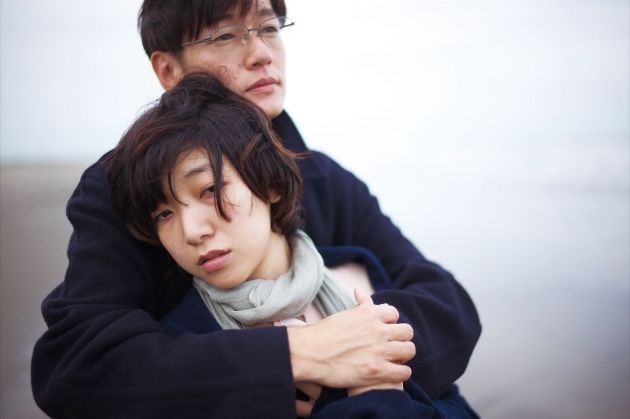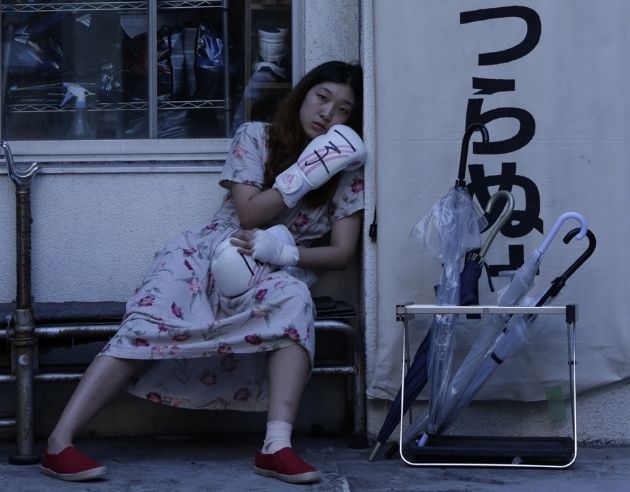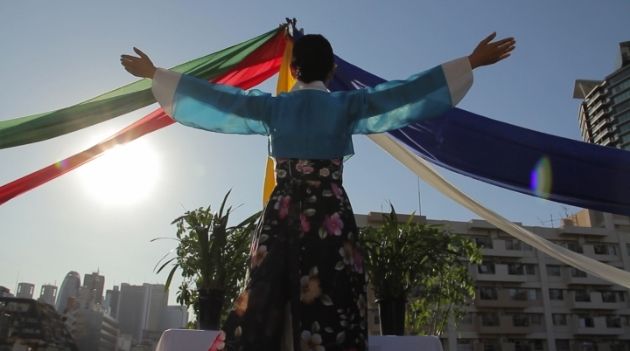Japan Cuts 2015 runs July 9 through 19. Please visit Japan Society website.
Here are 4 outstanding quality films I got to see:
HIBI ROCK: PUKE AFRO AND THE POP STAR - Opening Night Film. July 9, 9pm [Introduction and Q&A with director Yu Irie, followed by OPENING NIGHT Party!]

Returning to Japan Cuts this year with two films (Hibi Rock and Joker Game), Yu Irie is a familiar face around this part of the world with his crowd pleasing films depicting Japan's indie music scene- 8000 Miles Series, Ringing in their Ears. His new film Hibi Rock: Puke Afro and The Pop Star, once again, plunges us into that music world he knows intimately.
Based on the popular manga by Katsumasa Enokiya, Hibi Rock concerns the minimally talented rock band Rock 'n' Roll Brothers (Hibinuma- guitar/vocal, Yoda- drums and Kusakabe- bass). The film is, more than any other Irie films, at its most cartoonish, but also most fun: lead singer Hibinuma (Shuhei Nomura), with his afro, deer in the headlight expression and his mouth agape, is ripped straight out of a freeze frame of a manga page. There are a lot of kicking balls and instantaneous nose-bleedings at exposed boobies also.
Always an underdog, Rock 'n' Roll Brothers barely survive on cleaning toilets of the small venue they sometimes get to play at. But their luck changes when a super pop idol Saki Udagawa (Fumi Nikaido of Ringing in Their Ears and Why Don't You Play in Hell?) shows up and take an interest in their music. It's not really their skills she's thrilled with, but their infectious energy and freedom. Because what's the point of rocking out if you are not free? Saki reminisces about her humble beginning in a high school band playing guitar. She tells Hibi that she is empty inside even though she is a mega star. She is well aware that her fame and popularity will fade away. She wants him to write her a song.
After getting rejected by Saki's all powerful promoter, downtrodden Rock 'n' Roll brothers split up. Hibi ends up working at a fish cannery, gutting fishes, Yoda in construction and Kusakabe a lumberjack. Hibi learns the news that Saki is hospitalized and in serious condition and decides to deliver the song he wrote for her. So he runs to Tokyo, the note he wrote the song on in one hand and a dead fish in the other.
As usual, Irie's penchant for portraying lovable losers and youthful energy takes the center stage in Hibi Rock. Nomura's perfect as an all out cartoonish front man and a virgin. Even though she plays a sick girl, Nikaido's smile still kills. Hibi Rock is a loving tribute to the spirit of Rock 'n' Roll.
ASLEEP - Centerpiece Presentation. July 16, 6:30pm [Introduction and Q&A with star Sakura Ando]

Based on one of the 3 stories from Banana Yoshimoto's novel of the same name, Asleep, tells a story of Terako (Sakura Ando of Love Exposure, 0.5mm, Penance), a young woman having an affair with an older, married man, Iwanaga, whose wife is in a coma. Terako spends most of her days in her bed under the fluffy covers in her underwear. She is kind of a kept woman in a sense, because Iwanaga wants her at his beck and call. She prods him about his wife in their rendez-vous in cheap hotel rooms, but he obviously doesn't want to talk about it much. Terako also struggles with the memories of Shiori, her roommate whose suicide impacted her life greatly. Shiori was sort of a 'sleep prostitute' - a person who keeps you company when you sleep.
The act of sleeping in Asleep is akin to a clinical depression. It's an exhausting affair. Terako finally realizes that Shiori's role to all those lonely people was to absorb their darkness like a sponge. Hence, she theorizes her roommate's death as sheer exhaustion from taking all that darkness. She needs to get out of her sleep-walking life. And the help comes from an unexpected source.
The film is far from being sad and gloomy. Always enigmatic Ando channels her soft, feminine side and gives our somnambulist heroine the subtlest, perfect emotional range. Photographer cum director Wakagi Shingo's uncluttered simple, airy look also betrays its potentially dark subject. In Wakagi's soft-edged world via quietly whimsical writings of Yoshimoto, waking moments are just as comforting and warm as your own bed.
100 YEN LOVE - Centerpiece Presentation. July 16, 8:45pm [Introduction and Q&A with star Sakura Ando with CUT ABOVE award ceremony. Followed by the PUNCH LOVE Party!]

I'm madly in love with Sakura Ando. The film tells a 32-year old no-do-gooder and a virgin slob Ichiko (Ando) still living with her parents, not helping her mom's small bento shop business and getting into a fist-fight with her just-divorced-single-mom sister. Her only outside contacts are a 24-hour 100 yen shop- American equivalent of a dollar store, where she gets her sustenance (junk food) from and a nearby boxing gym where she gets to glimpse of a boxer Yuji (Hirofumi Arai) exercising. He's not a good looking or anything, but she is entranced somehow.
After a big fight with her sister, Ichiko moves out and with the help of her softie mom, she gets a small flat and gets a night shift at the same 100 Yen store. Working there, she meets an assortment of weirdos who are just as much losers as she is. She even hooks up with Yuji, who always seem to forget his bananas he just bought at the store. "Why did I ask you out? Because I knew you wouldn't say no." He said coldly at their first date at the zoo. He invites her to his boxing match where he gets beaten badly. He says that he's 37 and that was his last match.
After being raped by a shady older co-worker, she decides to take up boxing herself. The coach mistakenly thinks that she's there to lose some weight but slowly but surely sees that she is determined to kick some ass, or maybe her own ass.
She finds Yuji inebriated in the corner of the street and takes him in and nurses him back to health. They become lovers of sorts. She still trains and works her night shift at the store.
It's a Jake LaMotta style transformation, only in reverse- Ichiko trains really hard and becomes a fit, ferocious girl. When asked by Yuji why box, she demurely answers, "I like how you hug each other and tap your shoulders after the match".
She bugs her coach, day and night, to give her a chance to get into the ring. The coach tells her that she is too old to be a professional boxer. The age limit for woman is 32. But she is determined to get that last chance to show the world that she is somebody. The coach tells her that it's no cakewalk.
We know she is 100 Yen kind of a gal. She says so herself. But would she stay a loser forever? The film is a total underdog story that largely relies on the shoulder of Ando and she gives, hands down, the best performance of the year here. Heart breaking and poignant, 100 Yen Love is easily one of the best films I've seen years.
VOICE OF WATER - July 17, 8:45pm

Veteran indie filmmaker Masashi Yamamoto (Three Points) directs this intriguing story involving a beautiful Zainichi (Korean-Japanese) shaman.
What started out as a half-hearted, simple easy money making scheme- palm reading with the help of her best friend Mina (Shuri), Minjung (Hyunri), a granddaughter of shimbang (Korean Shaman) becomes a face of a religious cult, God's Water, backed by a suave ad executive Akao (Jun Murakami) who sees money in the venture. Her sincere attitude, exoticism and beauty are mainly the selling point, showing real compassion for troubled, but gullible souls who pour out their sob stories in front of her.
In the meantime, Minjung's no-good father Mikio, who owes a lot of money to a ruthless yakuza, shove himself again in to her life and in to God's Water organization as a janitor.
Minjung starts to feel the fang of conscience about what she's doing. Mina assures conflicted Minjung that even though she doesn't have special powers, she is indeed helping these lost souls. After Minjung's encounter with an old blind woman, she has a breakdown and announces that she is leaving God's Water. It's a shock to everyone and puts the organization in frenzy to find a replacement. She embarks on a journey to find her family roots and her purpose in life in the woods of Saitama.
Yamamoto's interest doesn't rely on sensational aspect of the religious cult as it is often portrayed in films. It's also not an all out satire on modern illness of gullible lost souls grabbing at the straws for salvation. It's mostly about a Zainichi woman's journey to find her family roots that she never knew before, through traditional elements from her ancestry. The ending is somewhat predictable with the gangster plot and you-can't-cure-damaged-goods storyline. But Voice of Water is deeply humanistic and thoughtful and a completely different take on typical prejudice, racism ridden minority story.
No comments:
Post a Comment